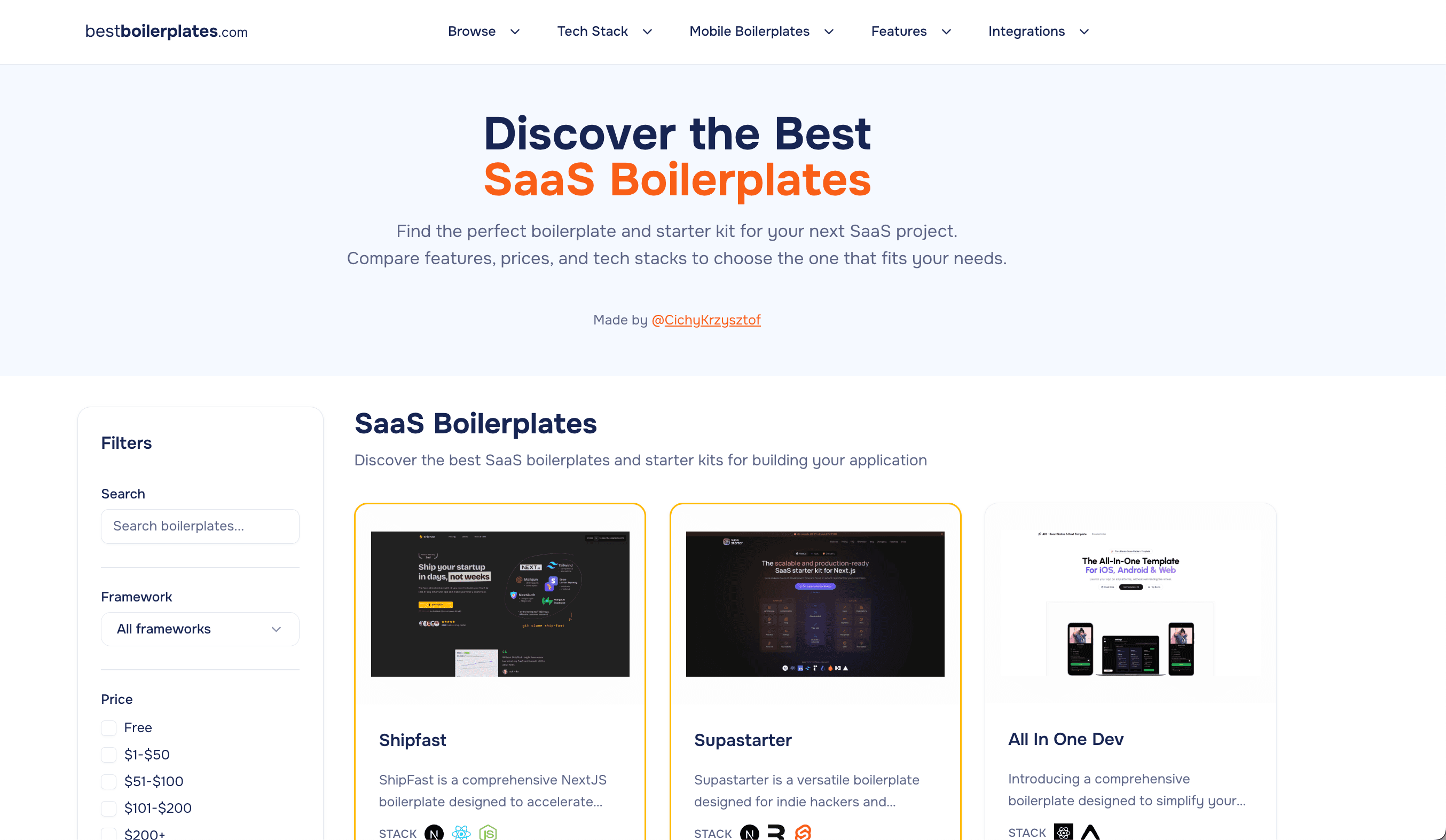Appwrite vs. AWS Cognito
Appwrite
Appwrite is an open-source platform for building scalable applications. It comes with authentication, databases, storage, and functions. It's basically a complete development platform. They have an extremely generous free plan with 75,000 MAUs free of charge and their Pro plan is only $15/month. Appwrite offers email and password login, phone auth, magic links, email OTP, anonymous login, JWT login, SSR login, custom tokens, and two-factor authentication.
AWS Cognito
Amazon Cognito is an identity platform for web and mobile apps. It’s a user directory, an authentication server, and an authorization service for OAuth 2.0 access tokens and AWS credentials. With Amazon Cognito, you can authenticate and authorize users from the built-in user directory, from your enterprise directory, and from consumer identity providers like Google and Facebook.
Reviews
Reviews
| Item | Votes | Upvote |
|---|---|---|
| No pros yet, would you like to add one? | ||
| Item | Votes | Upvote |
|---|---|---|
| No cons yet, would you like to add one? | ||
| Item | Votes | Upvote |
|---|---|---|
| No pros yet, would you like to add one? | ||
| Item | Votes | Upvote |
|---|---|---|
| No cons yet, would you like to add one? | ||
Frequently Asked Questions
AWS Cognito and Appwrite both offer robust user authentication solutions, but they cater to different needs. AWS Cognito excels in integrating with other AWS services, making it ideal for applications already within the AWS ecosystem. It supports a wide range of authentication methods and offers strong security features. On the other hand, Appwrite is an open-source platform that provides a comprehensive suite of development tools, including authentication. It is cost-effective with a generous free plan and is ideal for developers looking for a complete, scalable development platform that is not tied to a specific cloud provider. The best choice depends on whether you need tight integration with AWS services or a more general, cost-effective solution.
Appwrite offers a broader range of authentication methods compared to AWS Cognito. Appwrite supports email and password login, phone authentication, magic links, email OTP, anonymous login, JWT login, SSR login, custom tokens, and two-factor authentication. AWS Cognito also supports various authentication mechanisms, including integration with consumer identity providers like Google and Facebook, but it does not offer as many options as Appwrite. If diverse authentication methods are a priority, Appwrite may be the better choice.
Appwrite is generally more cost-effective than AWS Cognito, especially for small to medium-sized applications. Appwrite offers a very generous free plan with up to 75,000 Monthly Active Users (MAUs) and a Pro plan that costs only $15 per month. AWS Cognito pricing is based on the number of MAUs and can become more expensive as your user base grows. If budget constraints are a significant factor, Appwrite provides a more economical solution.
Appwrite is an open-source platform designed for building scalable applications. It includes features such as authentication, databases, storage, and functions, making it a comprehensive development platform.
Appwrite supports a variety of authentication methods including email and password login, phone authentication, magic links, email OTP, anonymous login, JWT login, SSR login, custom tokens, and two-factor authentication.
Appwrite offers an extremely generous free plan that includes 75,000 monthly active users (MAUs) at no charge. Their Pro plan is available for $15 per month.
Appwrite's main features include authentication, databases, storage, and functions. These components work together to provide a complete development platform for building scalable applications.
Yes, Appwrite is an open-source platform. This allows developers to customize and extend its functionalities according to their needs.
Amazon Cognito is an identity platform for web and mobile apps. It serves as a user directory, an authentication server, and an authorization service for OAuth 2.0 access tokens and AWS credentials. With Amazon Cognito, you can authenticate and authorize users from the built-in user directory, from your enterprise directory, and from consumer identity providers like Google and Facebook.
Pros of AWS Cognito include its generous free tier, low price per monthly active user, and strong integration with the AWS ecosystem. These features make it a cost-effective and scalable solution for user authentication. However, some users may find the setup and configuration complex if they are not familiar with AWS services.
AWS Cognito can handle authentication from the built-in user directory, enterprise directories, and consumer identity providers like Google and Facebook. This makes it versatile for different types of applications and user bases.
Yes, AWS Cognito is suitable for large-scale applications due to its scalability and integration with the AWS ecosystem. It can handle a high number of users and provides features like multi-factor authentication and encryption for added security.
Yes, AWS Cognito integrates seamlessly with other AWS services such as AWS Lambda, Amazon API Gateway, and Amazon S3. This allows developers to build comprehensive solutions with secure user authentication and data management.
Related Content & Alternatives
- 2
 1.Amazon Cognito
1.Amazon CognitoThe biggest advantage of Cognito is that it's a part of the AWS ecosystem and integrates well with other AWS services. The free tier comes with 50,000 MAUs and the price for each additional MAU starts at $0.0055/month and goes down to as low as $0.0025/month as you scale to tens of millions of users. It integrated with four federated identity providers - your users can sign up with Facebook, Google, Apple and Amazon.
- 1
 2.Firebase
2.FirebaseGoogle's Firebase is an entire app development platform that's packed with features.It comes with storage, cloud functions, monitoring and, of course, user authentication. The free tier comes with 50,000 MAUs. Beyond that pricing start at $0.0055/MAU and goes down to as low as $0.0025/MAU as you scale to millions of users. Firebase authentication supports email and password auth, phone auth, magic links, two-factor authentication and social identity providers - mainly Google, Google Play Games, Facebook, Apple, Microsoft, Twitter, GitHub and OAuth access tokens.
- 1
 3.Auth0 by Okta
3.Auth0 by OktaAuth0 is an identity and access management (IAM) platform designed to simplify authentication and authorization for applications. It provides a flexible solution that allows developers to implement secure login systems without having to build them from the ground up. Auth0 supports various authentication methods, including username-password credentials, social logins (like Google, Facebook, and GitHub), enterprise identity providers (such as Active Directory and SAML-based systems), and passwordless options. The platform is highly adaptable, offering over 30 software development kits (SDKs) that cater to a wide range of languages and frameworks—JavaScript, Python, .NET, iOS, Android, and more. This makes integration straightforward regardless of the tech stack. Beyond basic authentication, Auth0 offers advanced features like multi-factor authentication (MFA), single sign-on (SSO), and fine-grained authorization. These tools enable organizations to enforce complex access control policies, supporting both role-based (RBAC) and attribute-based (ABAC) models. Auth0 also addresses enterprise needs through features like user provisioning, directory synchronization, and support for B2B, B2C, and B2E use cases. It’s designed with scalability in mind, making it suitable for both startups and large enterprises. The platform’s extensibility allows developers to customize authentication flows, implement rules for conditional access, and integrate third-party services. Since its acquisition by Okta, Auth0 operates as a product unit under the Okta umbrella, complementing Okta’s broader suite of identity solutions while maintaining a developer-first focus. This combination brings together Okta’s enterprise-grade security with Auth0’s developer-centric approach, offering a comprehensive solution for modern identity challenges.
- 1
 4.Clerk
4.ClerkClerk is a comprehensive user management and authentication platform designed to streamline how developers handle user accounts within web and mobile applications. It offers a suite of embeddable UI components—such as <SignIn/>, <SignUp/>, <UserButton/>, and <UserProfile/>—that integrate seamlessly into your application without redirecting users off-site. These components are fully customizable to match your brand, making the user experience cohesive and frictionless. Under the hood, Clerk provides a robust API and SDKs compatible with modern frameworks like Next.js, Remix, React, and Expo. It handles the entire authentication lifecycle, supporting multifactor authentication (MFA), session management, passwordless sign-in (via magic links or one-time passcodes), and traditional password-based methods with breach detection. The platform also integrates social sign-on (SSO) with over 20 providers, enabling quick user onboarding while adhering to security best practices. Clerk’s security posture includes SOC 2 Type 2 certification and CCPA compliance, with continuous third-party audits and penetration testing. Fraud prevention measures, like disposable email blocking and bot detection powered by machine learning, are built-in to reduce spam and abusive sign-ups. For B2B SaaS applications, Clerk provides advanced multi-tenancy features, enabling organization-based user management with custom roles, permissions, auto-join functionality based on email domains, and invitation systems—all accessible through both code and an admin dashboard. Developers benefit from rapid integration, significantly reducing the time spent on building authentication systems from scratch. Clerk acts as the single source of truth for user data and integrates seamlessly with popular backend services like Supabase, Firebase, and Convex. With free access for up to 10,000 monthly active users, it’s positioned as a scalable solution that grows with your application’s needs.
- 1
 5.Supabase
5.SupabaseSupabase is the open-source alternative to Firebase. Like Firebase, it's a complete app development platform with user authentication, cloud functions, APIs, Postgres database, storage, vector embeddings, and other features. Supabase projects come with PostgreSQL's policy engine for fine-grained user access rules. It has social login integrations with Google, Facebook, GitHub, Azure (Microsoft), Gitlab, Twitter, Discord, and many more. They offer a customizable authentication component for React. Phone login and MFA can be added through third-party SMS providers such as Twilio or Bird. The free tier comes with 50,000 monthly active users. The Pro plan, at $25/month, comes with 100,000 MAUs and $0.00325/MAU beyond that.
- 0
 6.Stytch
6.StytchStytch provides a suite of tools designed to simplify authentication, authorization, and security for web and mobile applications. If you're developing an app and need a way for users to log in—whether with passwords, passkeys, or entirely passwordless methods—Stytch offers APIs and SDKs that handle these complexities. Their focus is on making authentication seamless for both developers and end-users while ensuring high security standards. For businesses, particularly B2B SaaS companies, Stytch enables advanced features like multi-tenancy, role-based access control (RBAC), and single sign-on (SSO). They provide an embeddable admin portal, allowing enterprise customers to manage their own authentication configurations, organizational settings, and integrations with identity providers—without constant developer involvement. Stytch places a strong emphasis on scalability and flexibility. Their tools are designed to “just work” across a range of use cases, from simple consumer apps to complex enterprise platforms. Developers can choose how much of the authentication flow they want to control—using pre-built UI components for quick implementation or leveraging headless SDKs and backend APIs for a fully customized experience. Security and fraud prevention are also core to Stytch’s offering. They provide real-time bot detection, device-aware multi-factor authentication, and intelligent rate limiting to protect against credential stuffing and other forms of account abuse. Their infrastructure ensures that login codes and authentication requests are delivered reliably, even when SMS or email providers fail. Stytch supports a broad range of programming languages and frameworks, including Python, Node.js, Java, React, and iOS, making integration into existing tech stacks straightforward. Their platform is designed for developers who want to build secure, user-friendly authentication systems without reinventing the wheel.
- 0
 7.Kinde
7.KindeKinde has a generous free plan with up to 10,500 MAU free of charge. Their Pro plan costs $25/month and the price for each additional MAU over 10,500 is $0.0175.
- 0
 8.Ory
8.OryOry is an API-first identity manager. They offer authentication, analytics, access control, machine-to-machine authentication and more. They have SDKs for the major languages: - Dart - .NET - Elixir - Go - Java - JavaScript - PHP - Python - Ruby - Rust Unfortunately, they don't offer a free tier. Pricing starts at $29/month and includes 1,000 daily active users. Then it's $30 / 1,000 additional DAUs.
- 0
 10.Auth.js
10.Auth.jsFormerly known as NextAuth. It's is an open-source authentication library originally built for NextJS. Auth.js is free to use and comes with over 80 integrations for various third-party identity providers such as Google, Facebook, Auth0, Apple etc. You can use it with your own database if you choose to. It works with MySQL, Postgres, MSSQL and MongoDB. Auth.js is compatible with Next.js, SvelteKit and SolidStart as of March 2024.
- 0
 11.Keycloak
11.KeycloakKeycloak is an open source identity and access management solution. It supports Keycloak single-sign-on and OpenID Connect or SAML 2.0 Identity Providers (Google, Facebook, GitHub etc).
- 0
 12.Gluu Server
12.Gluu ServerGluu offers various authentication solutions based on open-source software. There is a self-hosted solution, a managed solution, and a free fully open-source solution based on the Linux Foundation Janssen Project.
- 0
 13.Okta
13.OktaOkta is an identity provider for organizations. It offers enterprise solutions for managing workforce and employee identities. It's HIPAA BAA and PCI compliant.
- 0
 14.Lucia Auth
14.Lucia AuthLucia is an open source auth library that abstracts away the complexity of handling sessions. It works with any JS runtime - Node.js, Bun, Deno, Cloudflare Workers. It's also fully typed. It integrates with MongoDB. PostgreSQL, MySQL, SQLite, and with their respective ORMs and query builders.
- 0
 15.GoPasswordless
15.GoPasswordlessGoPasswordless is an authentication service and SDK that focuses on enabling passwordless authentication flows in web apps.
- 016.OTPLESS
Authenticate customers with WhatsApp, SMS, Email, Biometrics, and more, with a 98% conversion rate on signup and sign-in.
- 1
 1.AppMole
1.AppMoleAppMole is an all-in-one platform featuring a wide range of AI-driven tools and resources tailored for creators, influencers, and developers. It offers various web apps, marketing tools, and design apps, all aimed at streamlining workflows and enhancing productivity. Users can stay updated with the latest AI applications, reviews, and trending software.
- 0
 19.StartKit.AI
19.StartKit.AIStartKit.AI is a boilerplate designed to speed up the development of AI projects. It offers pre-built REST API routes for all common AI tasks: chat, images, long-form text, speech-to-text, text-to-speech, translations, and moderation. As well as more complex integrations, such as RAG, web-crawling, vector embeddings, and much more! It also comes with user management and API limit management features, along with fully detailed documentation covering all the provided code. Upon purchase, customers receive access to the complete StartKit.AI GitHub repository where they can download, customize, and receive updates on the full code base. 6 demo apps are included in the code base, providing examples on how to create your own ChatGPT clone, PDF analysis tool, blog-post creator, and more. The ideal starting off point for building your own app!
- 1
 1.Best SaaS Boilerplates
1.Best SaaS BoilerplatesSaaSBoilerplates.dev is a curated directory that showcases a wide range of SaaS boilerplates, starter kits, and frameworks to help developers quickly launch their SaaS projects. The website features a carefully selected collection of tools and resources that cover various aspects of SaaS development, from authentication and payments to user management and deployment. Key Features 1. Extensive collection: SaaSBoilerplates.dev offers a comprehensive selection of SaaS boilerplates, catering to different frameworks, tech stacks, and development needs. 2. Curated by hand: The boilerplates are hand-picked and reviewed by a human to ensure quality, reliability, and relevance. No scraping, no AI-generated crap. 3. Detailed information: Each boilerplate listing includes a description, pricing, and key features to help readers make informed decisions. 4. Variety of use cases: The boilerplates cover a wide range of SaaS applications, including marketplaces, AI tools, landing pages, and more. Benefits 1. Time-saving: By leveraging pre-built boilerplates, developers can significantly reduce the time and effort required to set up the foundation of their SaaS project. 2. Cost-effective: Using boilerplates can help lower development costs by providing a solid starting point and reducing the need for custom development. 3. Scalability: Many boilerplates are designed with scalability in mind, making it easier to grow and expand the SaaS application as it gains traction. 4. Reduced technical debt: By using well-tested and maintained boilerplates, developers can minimise the risk of technical debt and ensure the long-term stability of their SaaS application. By leveraging the resources available on SaaSBoilerplates.dev, users can focus on building their core product features and bringing their SaaS ideas to life faster than ever before.
- 0
 6.BestBoilerplates.com
6.BestBoilerplates.comBestBoilerplates.com presents itself as a comprehensive directory and comparison engine for SaaS boilerplates and starter kits. On the site, you can browse a curated catalog of boilerplates from minimal starter-kits to full-blown, production-ready SaaS templates with authentication, payments, dashboards, multi-tenant support, blog/marketing modules and more. The main selling point is convenience: rather than manually researching dozens of boilerplate projects across GitHub or various marketplaces (each with different tech stacks, sets of built-in features, and price points), BestBoilerplates.com lets you filter by framework, features, integrations, price bracket and compare multiple options side-by-side. For startups, indie developers, small teams or solo founders — particularly those building a SaaS, MVP, web app or mobile app — this can be a huge time-saver. The idea is: skip the repetitive “core plumbing” (auth, billing, dashboard, basic UI, subscription flows, etc.), and get straight to developing your unique business logic or features. Strengths / What it does well - Wide selection & variety: The directory covers many tech stacks (Next.js, React, Node, Laravel, etc.) and project types (web apps, mobile apps, SaaS, MVPs, AI-powered apps, etc.), giving developers flexibility depending on what they build. - Easy comparison of features & price: Because boilerplates vary widely (some are minimal and free, others full-featured and paid), having a filter + comparison view helps in quickly narrowing down to those matching your budget and technical requirements. - Saves time — avoids reinventing the wheel: Many boilerplates on the site already take care of standard SaaS needs (authentication, user management, payments, dashboards, content/marketing pages, etc.), which means you don’t waste days or weeks wiring up basic infrastructure before building product-specific features. - Potential for faster MVP / launch: For early-stage ideas, or when you want to test a SaaS idea quickly, starting with a boilerplate can drastically reduce setup time and let you validate the core product sooner. This is arguably one of the biggest benefits for startups and solo developers. Verdict — Who Should Use It, and With What Expectations BestBoilerplates.com is a strong tool for developers or founders who want to ship fast: ideal if you’re building a SaaS MVP, launching a startup, or just want a solid foundation so you can focus on product features instead of boilerplate plumbing.


